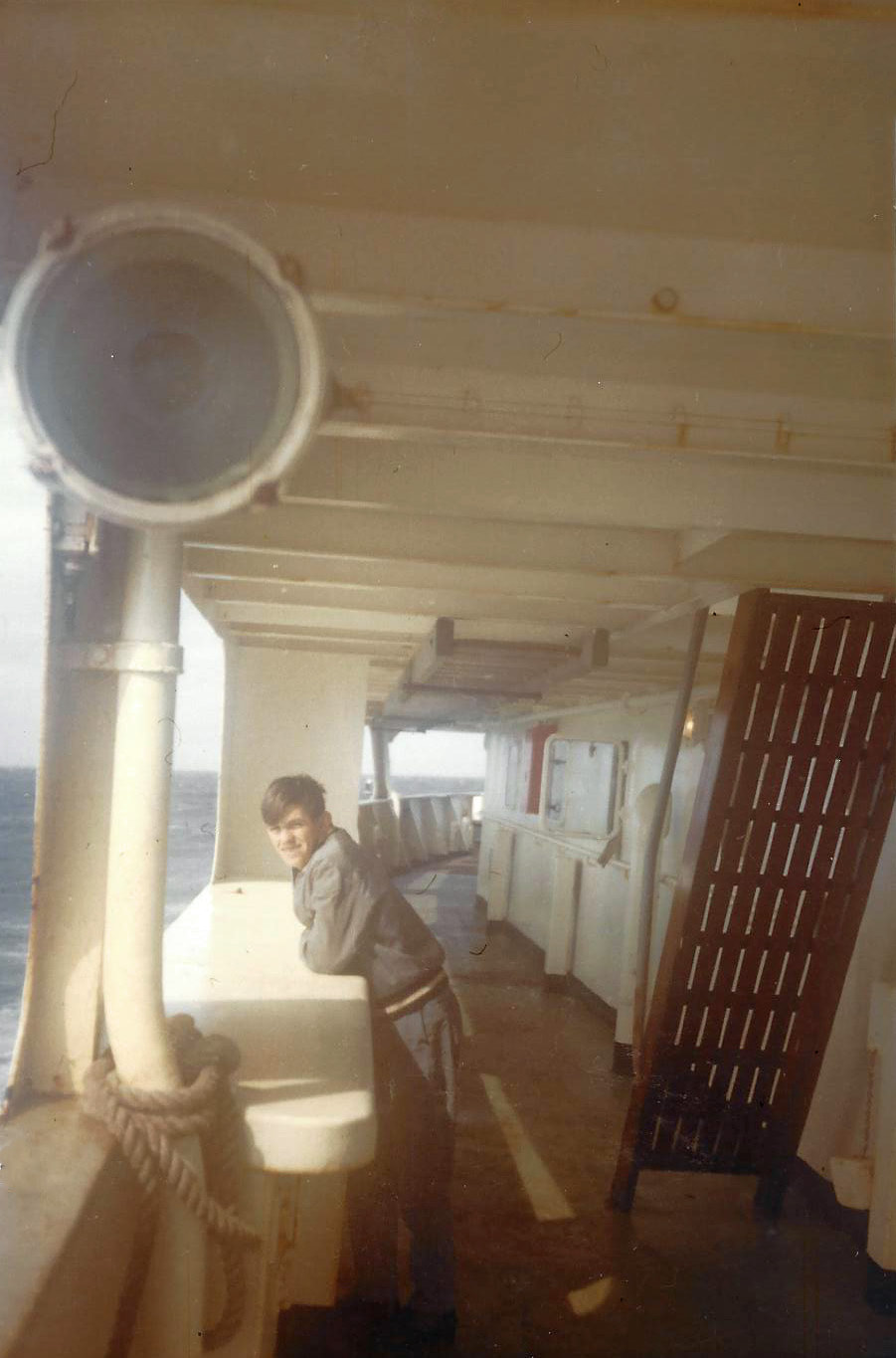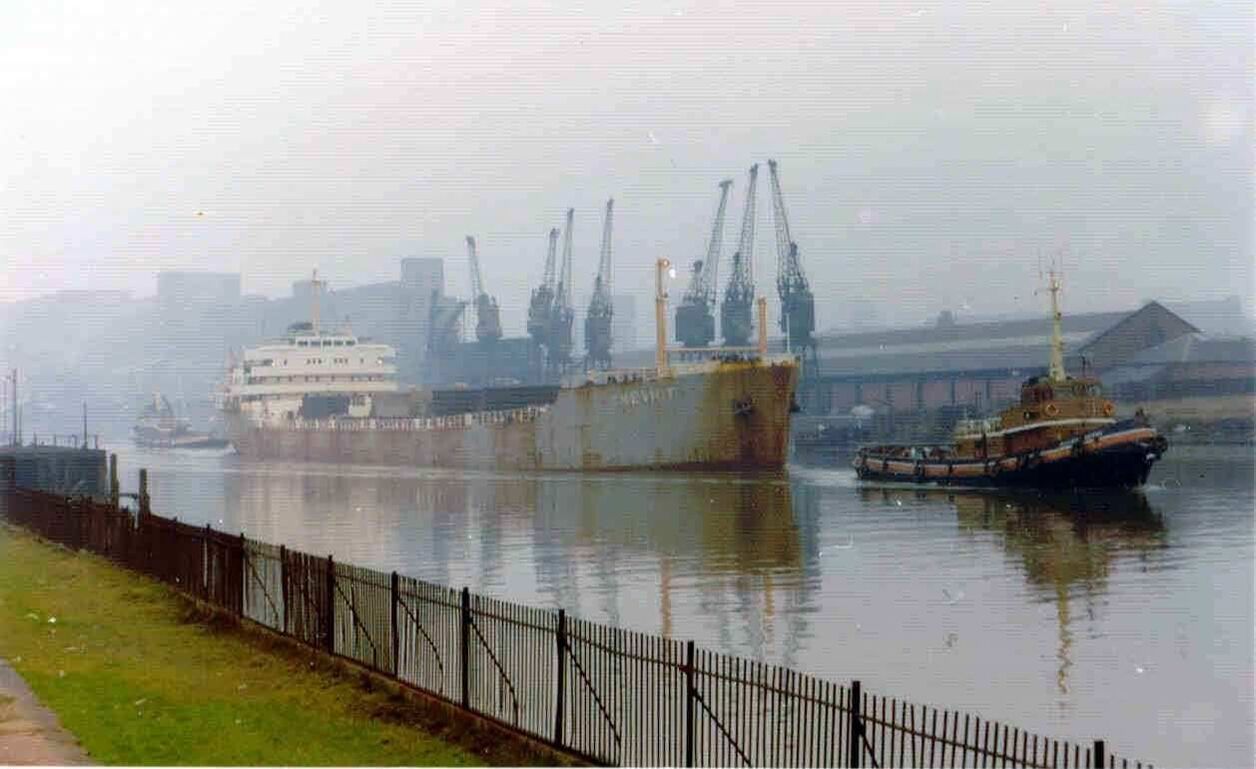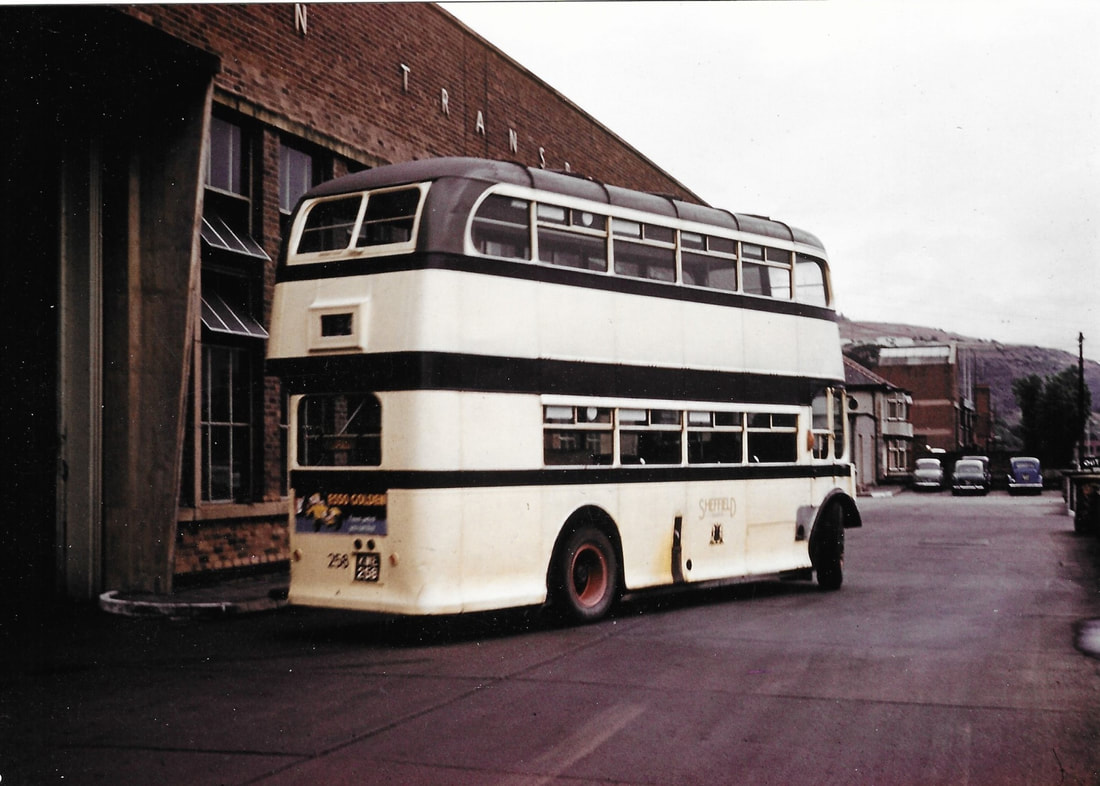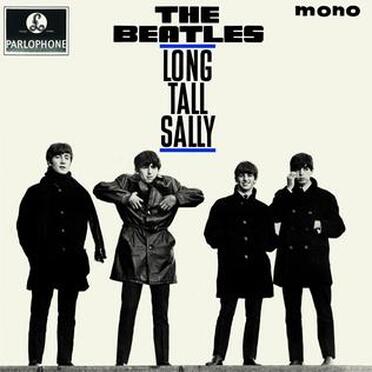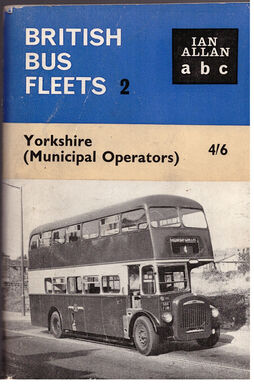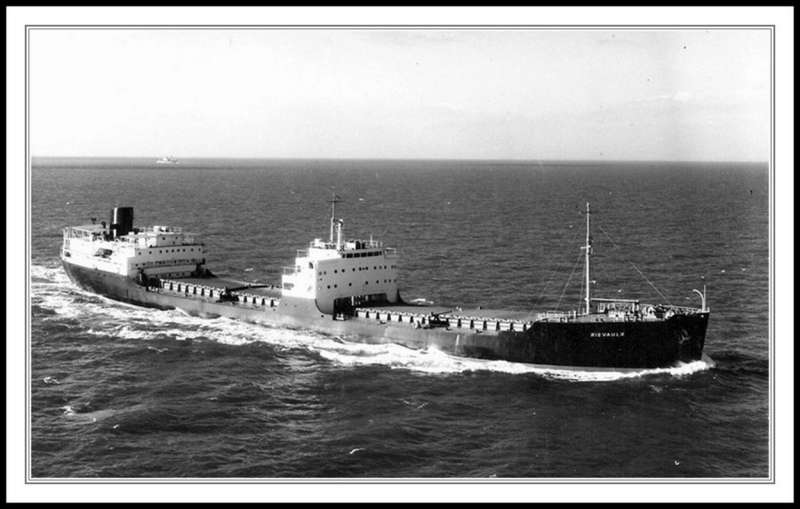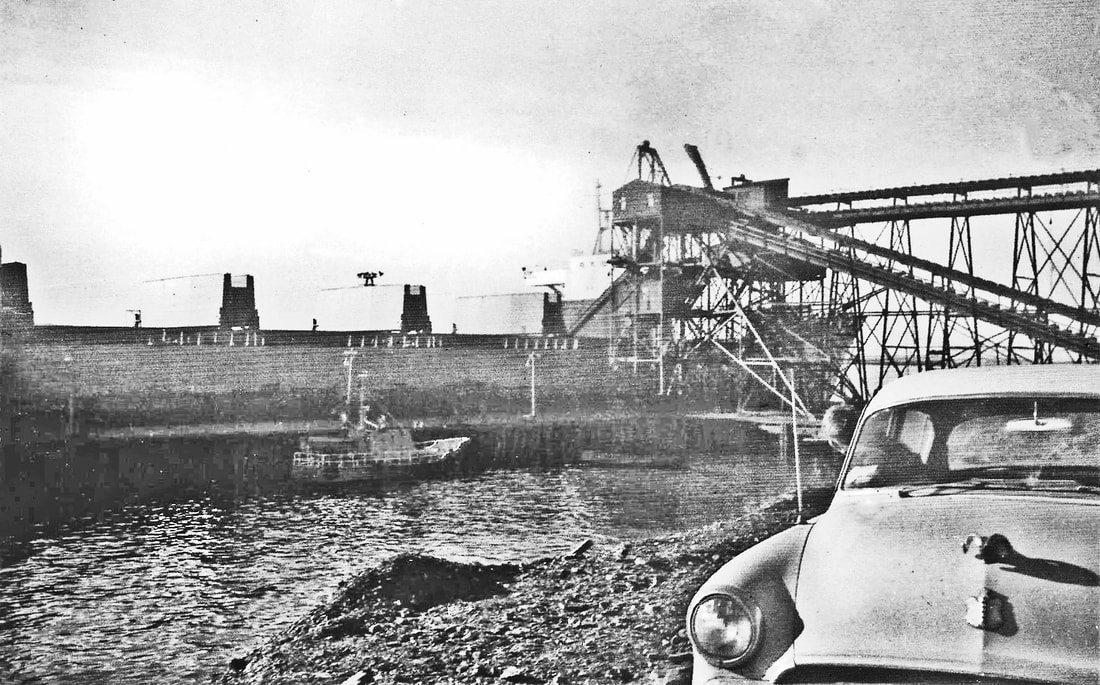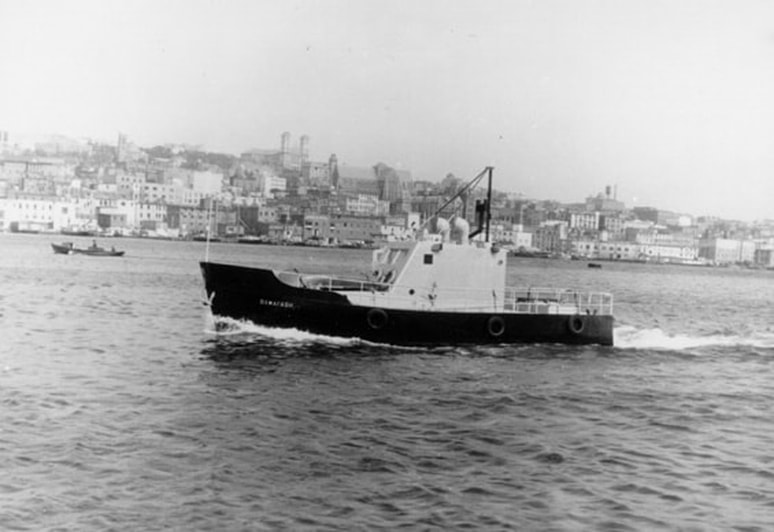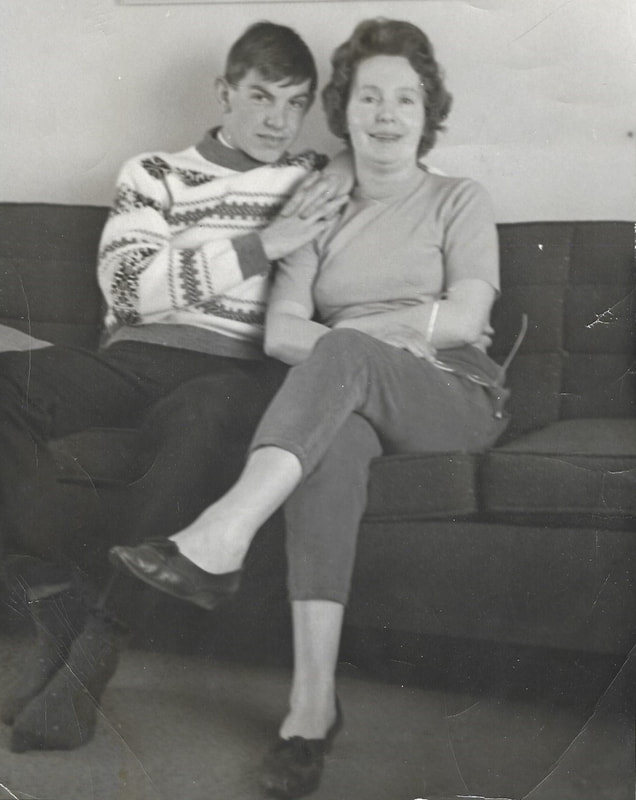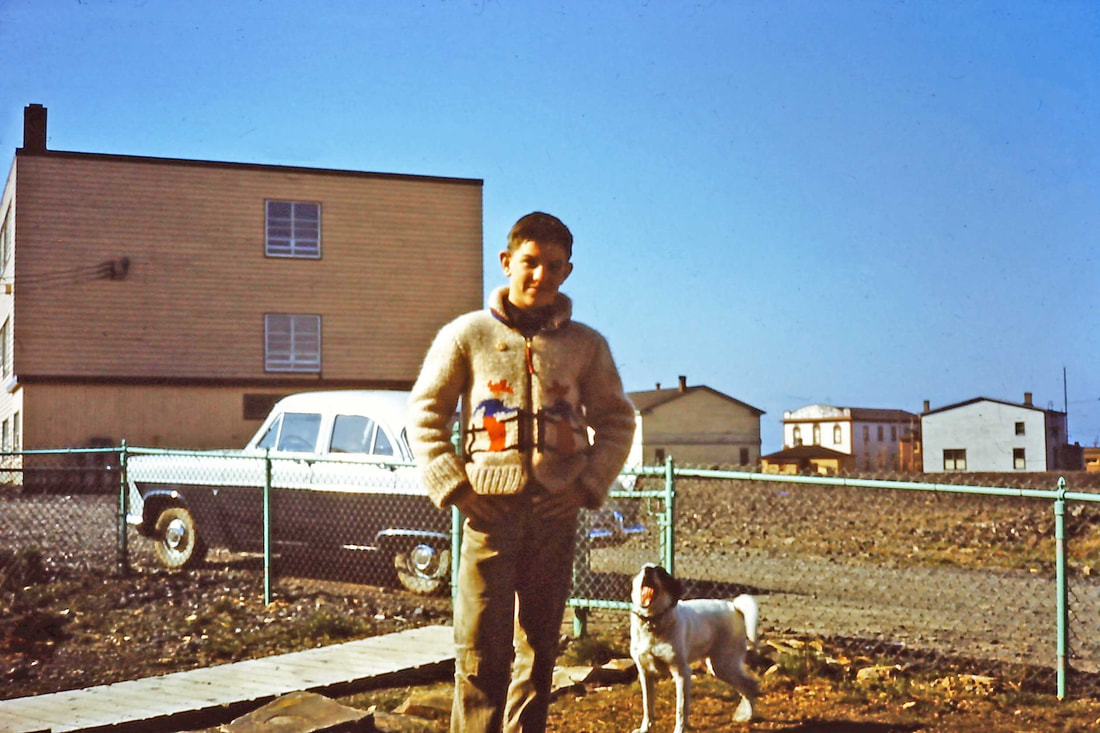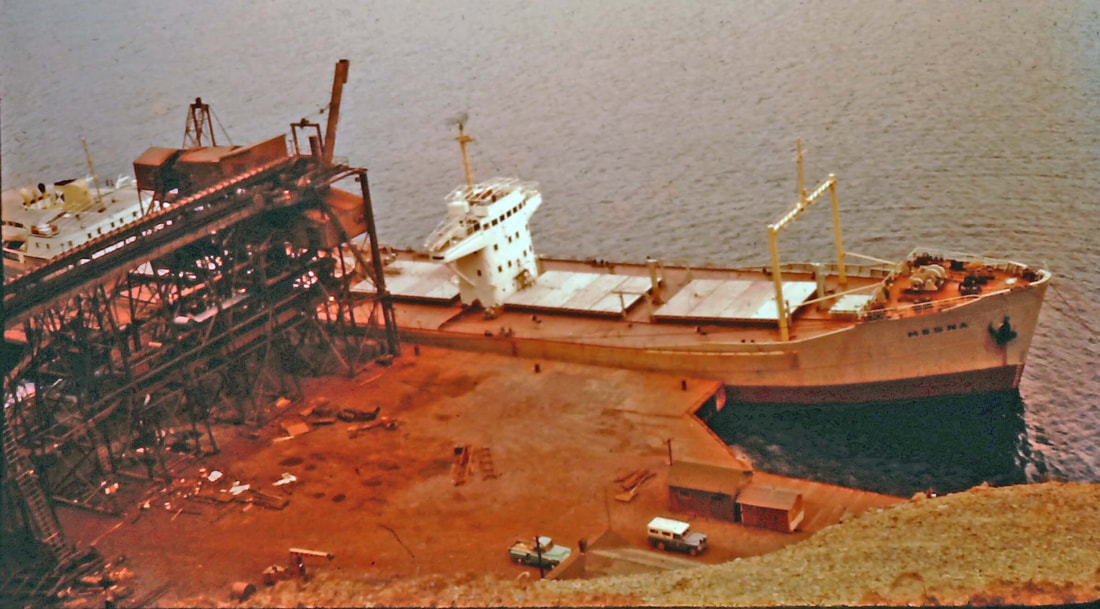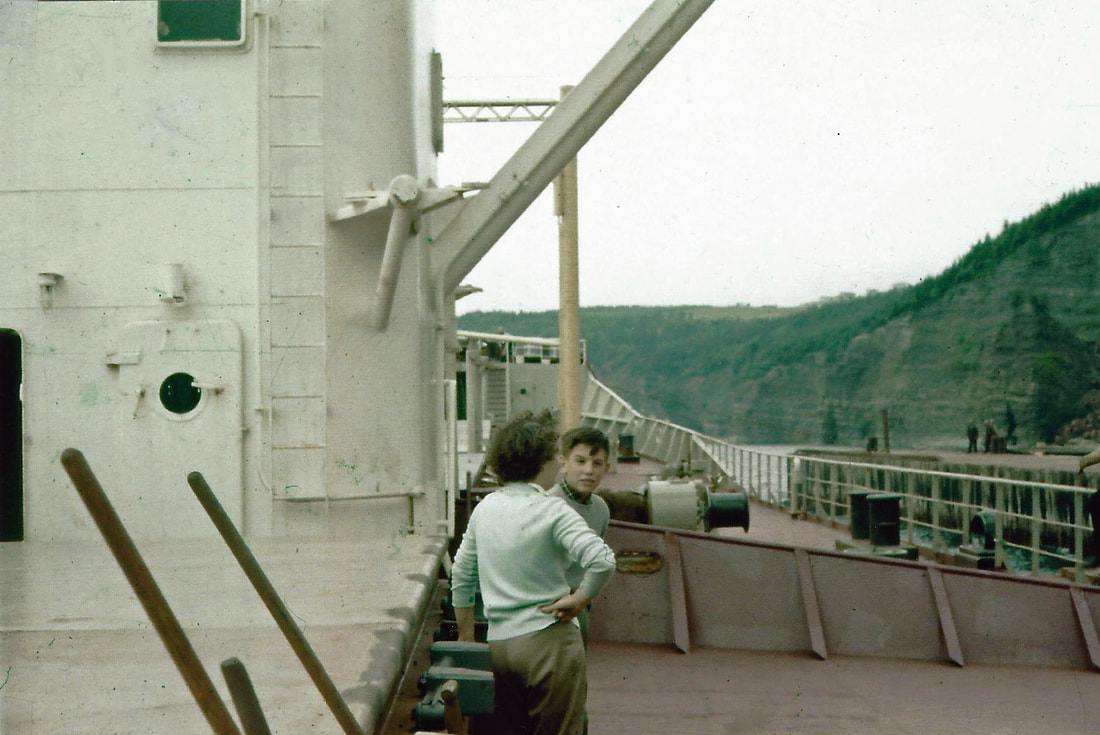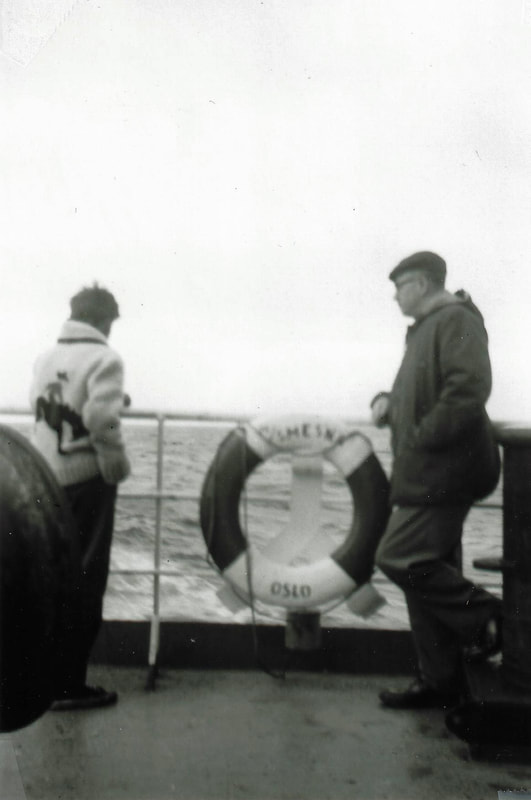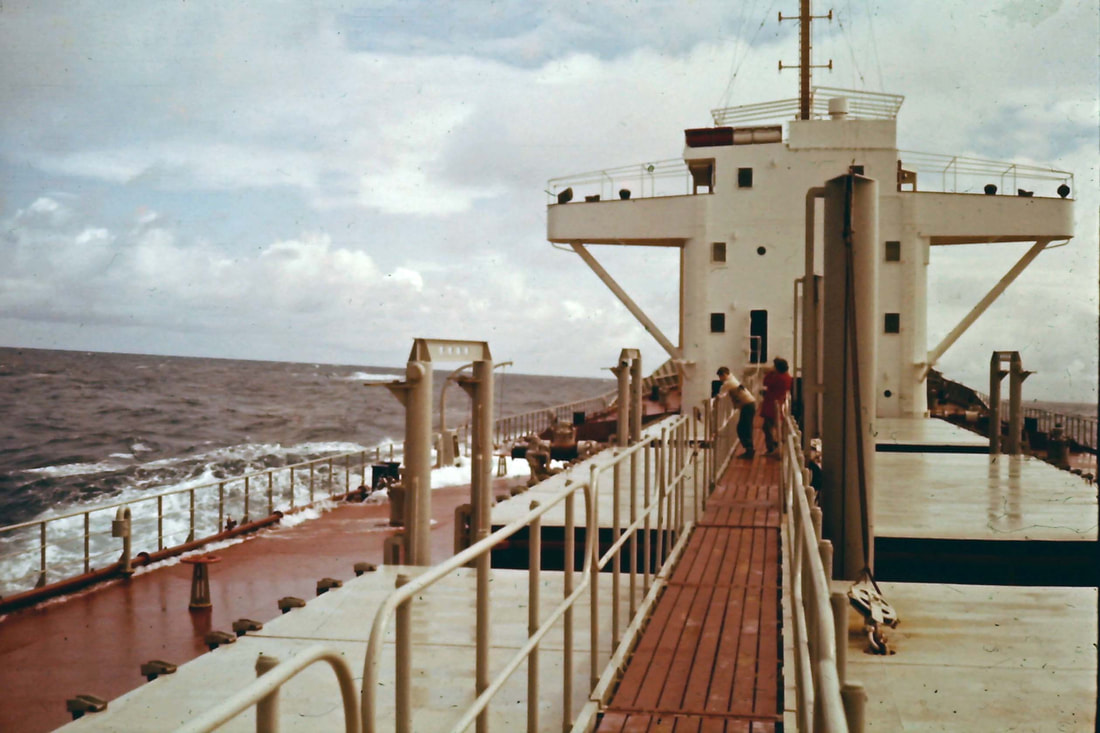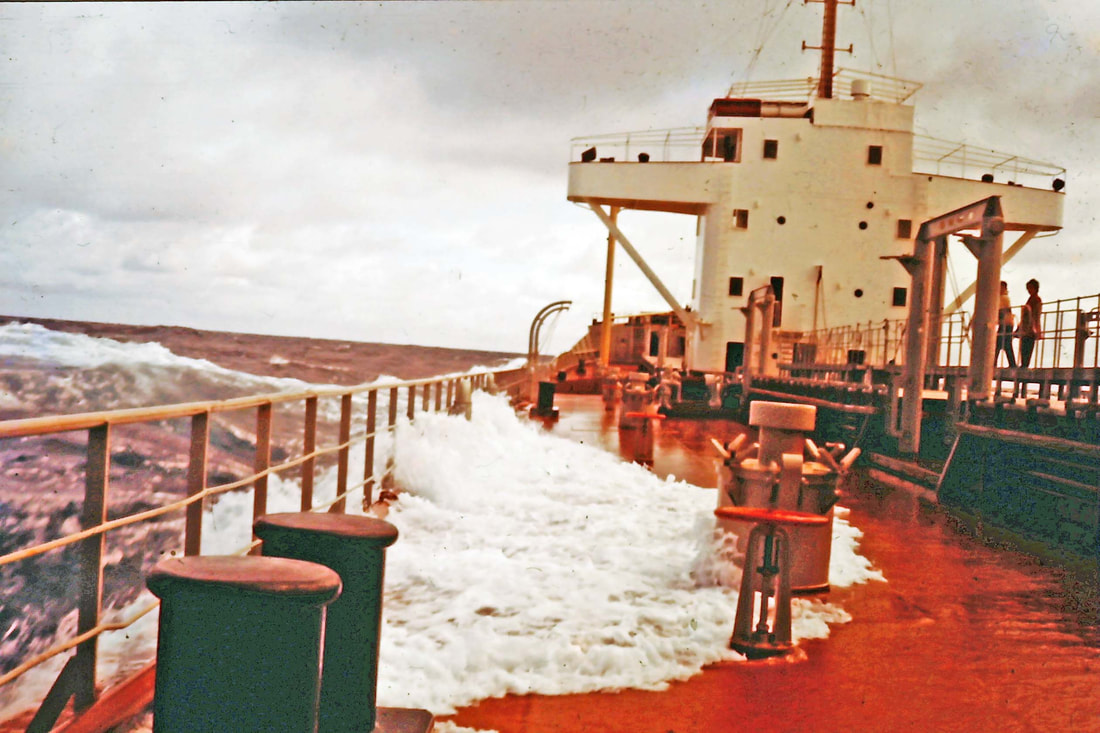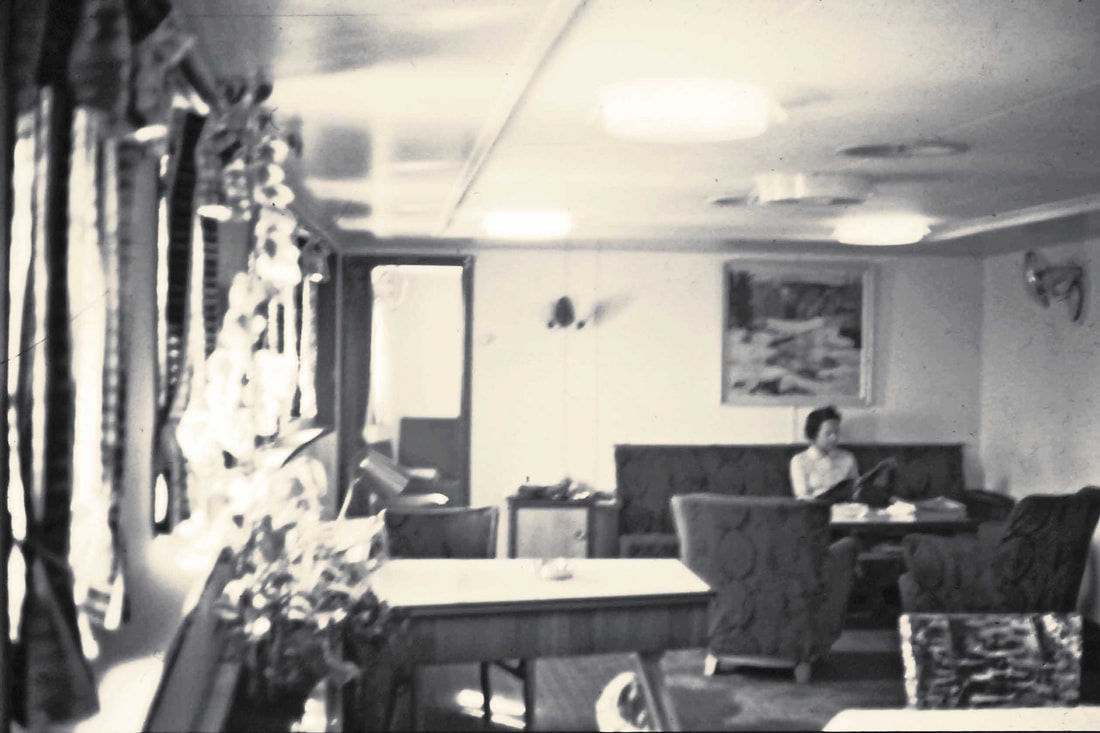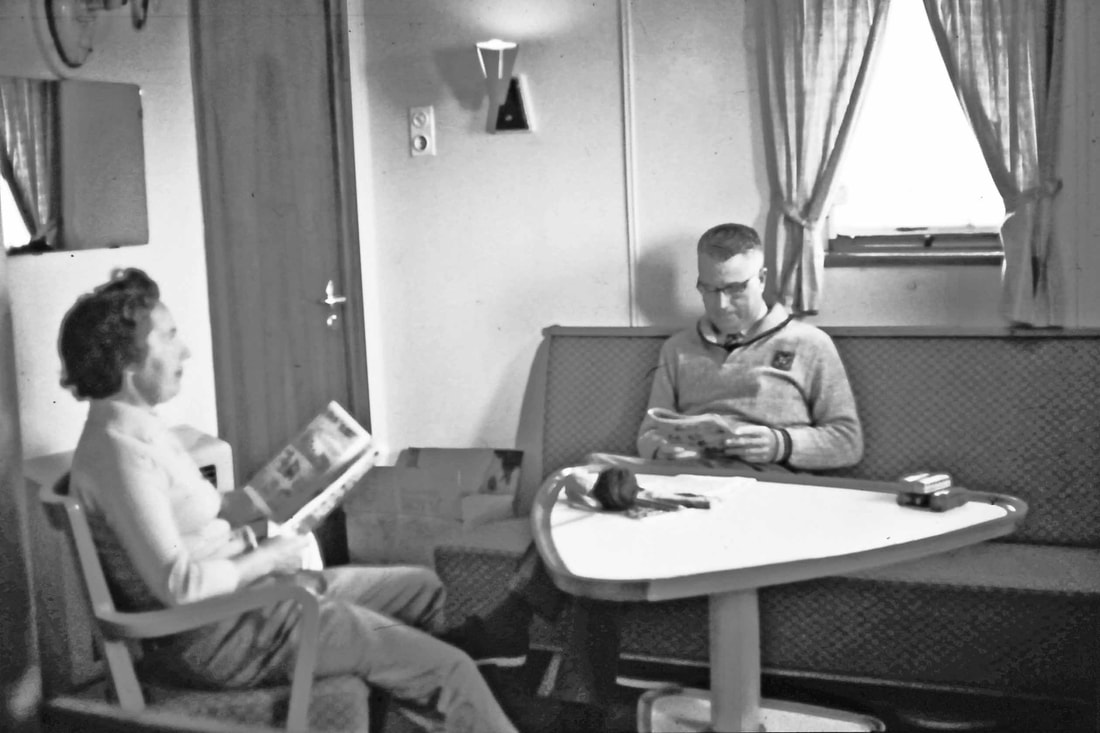EXTRAS
PERSONAL EXPERIENCE STORIES
PERSONAL EXPERIENCE STORIES
"MY TRAVELS ON WABANA ORE CARRIERS IN THE 1960s"
"Och, you cannae get off here!"
A recollection of crossing the Atlantic Ocean with a shipload of Wabana iron ore
"Och, you cannae get off here!"
A recollection of crossing the Atlantic Ocean with a shipload of Wabana iron ore
by
Dave Careless
Dave Careless
About the author: Dave Careless was born March 13, 1948 in Rotherham, in the coal-mining district of South Yorkshire, England. His father, Tom Careless, was working in the wages office of the National Coal Board at Aldwarke and Silverwood pits when he received a job offer in the autumn of 1957 to come to Bell Island to work at DOSCO's Main Office in charge of production and projections, determining how much ore was being produced and how much was required to fill the order books. Tom came on his own to get the lay of the land and was quickly promoted to Assistant to the General Manager (a position he held until the mines closed in 1966). In March of 1958, 10-year-old Dave and his mother, Jennie, arrived in Newfoundland. This is the story of Dave's memories of his eight years living on Bell Island before the mines closed. (Read more about Tom Careless in the "C" section of the "People" page on this website. See more Careless photos on the "Photo Gallery" page. Read more of Dave Careless' Bell Island memories in "Personal Experience Stories" under "Extras" in the top menu.)
I wonder just how many people are able to say exactly where they were and what they were doing on a particular date, 59 years ago. It just so happens that with respect to August 26th, the day I started writing this memoir in 2023, I can tell you just where I was and what I was doing, on this date in 1964!
In the Spring of that year, probably sometime in April, while we were living in our small company house on Greenwood Avenue in Wabana, my grandmother back in Sheffield in northern England had run into a spot of trouble. She'd suffered a minor heart attack and, although she wasn't kept in hospital very long, she was recuperating at home. Because my aunt, my mother's youngest sister who lived with her, had to go out to work every day, my mother had no choice but to fly back to the UK to help out and assist my grandmother in her recovery. By mid-June my mother was getting ready to consider returning to Bell Island, at which point my father told her not to rush back. He suggested instead that she might as well stay there for the rest of the summer, and that when Grade Ten at St. Boniface ended near the end of June, both he and I would sail over on any available ore carrier that would take us. Then my mother and I could stay in Sheffield for the summer, while my father would have to fly back to Newfoundland after his three-week holiday. Towards the end of August, with the new school year looming, provided we could arrange a passage, my mother and I could sail back to Bell Island on an ore carrier that was destined for Wabana to pick up a cargo of iron ore. Anyway, that was the rather vague plan, and it more or less went just the way they planned it.
It was already ten days or more into July before my father and I actually set sail on the ore carrier, Cheviot, headed to Glasgow with several thousand tons of Wabana iron ore, the ore destined no doubt for the blast furnaces at Ravenscraig steelworks on Clydeside, and father and I destined for a reunion with my mother after several months of fending for ourselves on Greenwood Avenue! Patch, the family dog was, not for the first time, entrusted to the care of a then young Jim Hearn and his family on Armoury Road until my father returned in early August. Travel-wise, the voyage to Glasgow was uneventful, except there was apparently quite a bit of loose ice mid-Atlantic (long before the days of climate change!) and the ship was forced to go quite a bit slower than it normally would have done, due to this and some very thick fog encountered during the journey. My dad was thrilled one night during the voyage when I beat the entire ship's crew at darts; all those hours of 'throwing arrows' at the dartboard in the spare room at Greenwood Avenue had eventually paid off!!
The photo below of Dave onboard the Cheviot is by Tom Careless.
In the Spring of that year, probably sometime in April, while we were living in our small company house on Greenwood Avenue in Wabana, my grandmother back in Sheffield in northern England had run into a spot of trouble. She'd suffered a minor heart attack and, although she wasn't kept in hospital very long, she was recuperating at home. Because my aunt, my mother's youngest sister who lived with her, had to go out to work every day, my mother had no choice but to fly back to the UK to help out and assist my grandmother in her recovery. By mid-June my mother was getting ready to consider returning to Bell Island, at which point my father told her not to rush back. He suggested instead that she might as well stay there for the rest of the summer, and that when Grade Ten at St. Boniface ended near the end of June, both he and I would sail over on any available ore carrier that would take us. Then my mother and I could stay in Sheffield for the summer, while my father would have to fly back to Newfoundland after his three-week holiday. Towards the end of August, with the new school year looming, provided we could arrange a passage, my mother and I could sail back to Bell Island on an ore carrier that was destined for Wabana to pick up a cargo of iron ore. Anyway, that was the rather vague plan, and it more or less went just the way they planned it.
It was already ten days or more into July before my father and I actually set sail on the ore carrier, Cheviot, headed to Glasgow with several thousand tons of Wabana iron ore, the ore destined no doubt for the blast furnaces at Ravenscraig steelworks on Clydeside, and father and I destined for a reunion with my mother after several months of fending for ourselves on Greenwood Avenue! Patch, the family dog was, not for the first time, entrusted to the care of a then young Jim Hearn and his family on Armoury Road until my father returned in early August. Travel-wise, the voyage to Glasgow was uneventful, except there was apparently quite a bit of loose ice mid-Atlantic (long before the days of climate change!) and the ship was forced to go quite a bit slower than it normally would have done, due to this and some very thick fog encountered during the journey. My dad was thrilled one night during the voyage when I beat the entire ship's crew at darts; all those hours of 'throwing arrows' at the dartboard in the spare room at Greenwood Avenue had eventually paid off!!
The photo below of Dave onboard the Cheviot is by Tom Careless.
We eventually got to Greenock, or 'Tail of the Bank,' as it was known locally, in the middle of the afternoon of Saturday, July 17th. My father was quite upset when he was told by a very 'strictly by the book' official who came on board that he and I wouldn't be able to get off the ship until it went up to the unloading dock in Port Glasgow on the Monday; there we would have to report to the local Passport Office in Glasgow to have our passports officially stamped.
“Och, you cannae get off here. You'll need to wait until Monday morning when the ship goes up tae the dock at Glasgow!” he proclaimed, which was a severe blow to father and me and our already thwarted travel plans. Expecting to arrive in the UK several days earlier than we did, my father had arranged for my mother to book a week in a holiday cottage in far-away Cornwall as of Sunday, the 18th, and here we were, on the afternoon of the 17th, still on the ship in Scotland with seemingly no hope of disembarking until at least Monday the 19th at the earliest!
Needless to say, the Customs official's dictate that we should stay on board for another couple of nights didn't sit well with father at all. So, after the man in the uniform had left the ship, both he and I made our way down a rope ladder at the ship's side into a small pilot boat and made our way to shore at Greenock, or somewhere else on the Clyde, along with Duncan, the ship's cook, and several bags of ship's dirty laundry heading for the launderette. Within an hour, we were on a train heading into Glasgow, both of us grinning widely at our resourcefulness!
Below is a photo of the British ore carrier, Cheviot, on which my father and I travelled from Bell Island to Greenock in Scotland in July, 1964.
“Och, you cannae get off here. You'll need to wait until Monday morning when the ship goes up tae the dock at Glasgow!” he proclaimed, which was a severe blow to father and me and our already thwarted travel plans. Expecting to arrive in the UK several days earlier than we did, my father had arranged for my mother to book a week in a holiday cottage in far-away Cornwall as of Sunday, the 18th, and here we were, on the afternoon of the 17th, still on the ship in Scotland with seemingly no hope of disembarking until at least Monday the 19th at the earliest!
Needless to say, the Customs official's dictate that we should stay on board for another couple of nights didn't sit well with father at all. So, after the man in the uniform had left the ship, both he and I made our way down a rope ladder at the ship's side into a small pilot boat and made our way to shore at Greenock, or somewhere else on the Clyde, along with Duncan, the ship's cook, and several bags of ship's dirty laundry heading for the launderette. Within an hour, we were on a train heading into Glasgow, both of us grinning widely at our resourcefulness!
Below is a photo of the British ore carrier, Cheviot, on which my father and I travelled from Bell Island to Greenock in Scotland in July, 1964.
Father had considered perhaps staying overnight at the hotel that was part of Glasgow's Central Station until he discovered how much a room would cost, and quickly a decision was made to hire a car then and there and drive to Sheffield, where we eventually arrived at about 3 a.m. on the Sunday morning! Only two things about the trip in particular stick out in my memory; one is that we got lost somewhere in the suburbs of Bradford in the middle of the night, and my father couldn't find reverse on the car and had to find a side street that was on an incline so that he could let the car roll backwards in order to get turned around. The other recollection is that we passed Sheffield's Herries Road bus garage at about 2:30 in the morning, with the garage and the floodlit forecourt chock full of Sheffield's beautifully turned out cream and dark blue double-deckers, which had fascinated me since I was old enough to talk. 'Stop, dad!” I yelled, desperate for a closer look, but my father just calmly said, “No, I don't think so,” and refused to even slow down, and we simply rolled on. He'd likely had just about enough of me at that point, and was desperate to get to my grandmother's, which was only about a mile further on at that point, eager to see my mother again, have a much-needed cup of tea and retire to bed for a few hours. Pulling over to look at a yard full of buses in the wee hours of a quiet Sunday morning absolutely wasn't on the agenda, not on that night anyway!
The photo below is of the forecourt of Sheffield's Herries Road bus garage, taken one afternoon in the summer of 1961, on one particular occasion when my father did agree to stop and get the camera out and take a photograph for me; mind you, it wasn't 2:30 a.m. and he hadn't been driving for the last six or seven hours from Glasgow to Sheffield! You can only imagine what it did look like in the early hours of that Sunday morning in 1964 when the entire garage and forecourt were stuffed full of buses! Photo by Tom Careless.
The photo below is of the forecourt of Sheffield's Herries Road bus garage, taken one afternoon in the summer of 1961, on one particular occasion when my father did agree to stop and get the camera out and take a photograph for me; mind you, it wasn't 2:30 a.m. and he hadn't been driving for the last six or seven hours from Glasgow to Sheffield! You can only imagine what it did look like in the early hours of that Sunday morning in 1964 when the entire garage and forecourt were stuffed full of buses! Photo by Tom Careless.
Reunited with my mother, about six hours later we were back on the road again, five of us in the car: father, mother, auntie Barbara, grandmother and me, destined for the south coast and that Cornish cottage in the delightful village of Looe. By the time we got there, quite late on the Sunday evening, my father and I had travelled more or less twenty-four hours, from Glasgow in Scotland to almost the very tip of south-west England in that hired Ford Zephyr, this being several years before the motorway age, and a lot of the mileage covered on secondary roads, especially in rural Cornwall.
The only particular recollections of Devon and Cornwall that I have are of buying a brand new Beatles 45-rpm record, "Long Tall Sally," in a record shop in Plymouth, and of buying a small booklet, still beside me on this desk today, British Bus Fleets No. 2 Yorkshire (Municipal Operators), in a nearby Plymouth bookshop; the booklet listed all the buses that my father refused to stop in order for me to look at early that Sunday morning all those years ago! I had to wait until we got back up to Sheffield again to play the record, and it only got one airing there. Paul McCartney's wonderful high-pitched scream before the guitar break in the middle of the title track was just too much for my grandmother to take in. “You can play that thing as many times as you like when you get back to Canada, but you're not playing it in this house again!” she ordered! Happy days!
The only particular recollections of Devon and Cornwall that I have are of buying a brand new Beatles 45-rpm record, "Long Tall Sally," in a record shop in Plymouth, and of buying a small booklet, still beside me on this desk today, British Bus Fleets No. 2 Yorkshire (Municipal Operators), in a nearby Plymouth bookshop; the booklet listed all the buses that my father refused to stop in order for me to look at early that Sunday morning all those years ago! I had to wait until we got back up to Sheffield again to play the record, and it only got one airing there. Paul McCartney's wonderful high-pitched scream before the guitar break in the middle of the title track was just too much for my grandmother to take in. “You can play that thing as many times as you like when you get back to Canada, but you're not playing it in this house again!” she ordered! Happy days!
The other specific memory of that week in Cornwall is all five of us going one evening to the idyllic village of Polperro, a bit of an artist's enclave if I'm not mistaken. Back in those days, the newspaper headlines were displayed on a sheet of paper on a board on the pavement in front of the newsagent's shop, with the headline for the day roughly scrawled on the sheet in black ink. That evening, Thursday July 22nd, not only was there the sight of a splendid Sheffield United Tours coach parked up at the roadside on a holiday tour to take in, I can distinctly remember the headlines on one of those display boards outside a paper shop proclaiming the untimely death the previous day of 27-year old Tottenham Hotspur & Scotland footballer John White. He had been struck by lightning whilst sheltering under a tree, having been caught in a downpour during a golf game somewhere in north London.
My father eventually flew back to Gander and then St. John's in early August, reclaiming Patch from his own holiday on Armoury Road, and returning to work in the DOSCO Main Office on Bennett Street. Meanwhile, my mother and I spent another couple of weeks in Sheffield before being advised that there was a ship heading for Bell Island towards the end of the month that might be willing to take a couple of passengers along for the ride; this was the Rievaulx, a then six-year old vessel owned by the Bolton Steam Shipping Co. Ltd. My mother was told that she and I should make ourselves ready at short notice to join the ship at Liverpool on Wednesday, August 26th for the voyage back to Bell Island. If everything went to plan, the Rievaulx would get me home to Greenwood Avenue just in time to start Grade Eleven at St. Boniface High School the day after Labour Day in early September.
My grandmother's next door neighbour, Ken Hall, a very kind, typical blue-collar Sheffield man, knowing my interest at the time in English football, had taken me on Saturday, August 22nd, to Hillsborough football stadium to watch Sheffield Wednesday football club in their season opener, in which they beat Blackburn Rovers 1-0. He had promised to take me to Bramall Lane on Wednesday night, the 26th, to watch Sheffield United in their first home game of the season as well, which of course had me well stoked! So, as you might imagine, being told that we had to be in Liverpool around midday on the 26th to board the Rievaulx was, at that moment, the very worst news possible!
After arriving at Liverpool Lime Street Station at about noon on Wednesday, and signing whatever documentation was necessary, the ship's agent very kindly took my mother and me to lunch at a nice restaurant in the centre of the city, and then drove us to where the ship was docked somewhere on the River Mersey, on the Birkenhead side of the river. After being allocated a cabin each, we were told that we might as well go ashore and enjoy the rest of the afternoon, as we would be stuck on the ship for the next five days at least. We did that, and I remember we had afternoon tea sat at a table outside a small cafe in Liscard Village, perhaps just a mile or so from the basin where the ship was docked. I recall my mother had a bit of a 'turn', and suddenly turned pale and felt faint. A local woman at another table must have noticed, and in her Merseyside accent, which, due to the prominence of the Beatles that year was of course unmistakable, said to my mother, “Are you alright, luv?” When my mum said she thought she'd be okay in a minute, the woman said, “Would you like to come back to my 'ouse and 'ave a lie down on the settee for an hour?” which I remember thinking was a particularly nice gesture, and so typical of ordinary working class people in that part of the country; I've never forgotten that act of kindness. Eventually, mother and I returned to the ship in time for dinner and to get settled down and comfortable. We didn't actually leave the dock and move into the river until after nightfall, and I couldn't help but be disappointed that I'd missed that Sheffield United football match for this! I was even more disappointed, as was my mother, when we moved into the mouth of the Mersey and dropped anchor there for the next three days! Blackpool Tower was just visible on the horizon, I remember. So near and yet so far!
Below is a photo of the motor vessel Rievaulx, with what looks to be a full load of what might well be Wabana iron ore.
My father eventually flew back to Gander and then St. John's in early August, reclaiming Patch from his own holiday on Armoury Road, and returning to work in the DOSCO Main Office on Bennett Street. Meanwhile, my mother and I spent another couple of weeks in Sheffield before being advised that there was a ship heading for Bell Island towards the end of the month that might be willing to take a couple of passengers along for the ride; this was the Rievaulx, a then six-year old vessel owned by the Bolton Steam Shipping Co. Ltd. My mother was told that she and I should make ourselves ready at short notice to join the ship at Liverpool on Wednesday, August 26th for the voyage back to Bell Island. If everything went to plan, the Rievaulx would get me home to Greenwood Avenue just in time to start Grade Eleven at St. Boniface High School the day after Labour Day in early September.
My grandmother's next door neighbour, Ken Hall, a very kind, typical blue-collar Sheffield man, knowing my interest at the time in English football, had taken me on Saturday, August 22nd, to Hillsborough football stadium to watch Sheffield Wednesday football club in their season opener, in which they beat Blackburn Rovers 1-0. He had promised to take me to Bramall Lane on Wednesday night, the 26th, to watch Sheffield United in their first home game of the season as well, which of course had me well stoked! So, as you might imagine, being told that we had to be in Liverpool around midday on the 26th to board the Rievaulx was, at that moment, the very worst news possible!
After arriving at Liverpool Lime Street Station at about noon on Wednesday, and signing whatever documentation was necessary, the ship's agent very kindly took my mother and me to lunch at a nice restaurant in the centre of the city, and then drove us to where the ship was docked somewhere on the River Mersey, on the Birkenhead side of the river. After being allocated a cabin each, we were told that we might as well go ashore and enjoy the rest of the afternoon, as we would be stuck on the ship for the next five days at least. We did that, and I remember we had afternoon tea sat at a table outside a small cafe in Liscard Village, perhaps just a mile or so from the basin where the ship was docked. I recall my mother had a bit of a 'turn', and suddenly turned pale and felt faint. A local woman at another table must have noticed, and in her Merseyside accent, which, due to the prominence of the Beatles that year was of course unmistakable, said to my mother, “Are you alright, luv?” When my mum said she thought she'd be okay in a minute, the woman said, “Would you like to come back to my 'ouse and 'ave a lie down on the settee for an hour?” which I remember thinking was a particularly nice gesture, and so typical of ordinary working class people in that part of the country; I've never forgotten that act of kindness. Eventually, mother and I returned to the ship in time for dinner and to get settled down and comfortable. We didn't actually leave the dock and move into the river until after nightfall, and I couldn't help but be disappointed that I'd missed that Sheffield United football match for this! I was even more disappointed, as was my mother, when we moved into the mouth of the Mersey and dropped anchor there for the next three days! Blackpool Tower was just visible on the horizon, I remember. So near and yet so far!
Below is a photo of the motor vessel Rievaulx, with what looks to be a full load of what might well be Wabana iron ore.
It was Sunday morning, July 30th, before we finally got underway and started heading away from Liverpool. I remember it was a wet and dreary day, but being out on the deck and taking in the scenery between Scotland and Northern Ireland as we sailed between the two to reach the open Atlantic is a very strong memory. As I recall, the rest of the journey was pretty much a nightmare, as the weather turned nasty, it being hurricane season, and the ship, in ballast only, rolled and pitched alarmingly for days on end. My mother quickly found her sea legs and didn't get seasick at all, but I succumbed and was ill for the better part of the entire voyage, not to mention being terrified that the ship might indeed break apart and sink. It was only when we got closer to Newfoundland that the weather and the seas abated to a fair degree, making it possible to at least step outside for a break to get some fresh air.
We had been at sea for a full week before we eventually sailed around Cape St. Francis and into a calm Conception Bay on Sunday, September 6th. The following day was the Labour Day holiday, and the day after that, Tuesday, September 8th, was the first day of the new school year and Clarence Rideout's Grade Eleven class. Perfect timing! Interestingly, although we couldn't go directly to Scotia Pier as there were other ore carriers either being loaded or waiting in line, we didn't automatically go to the anchorage off Kelly's Island, but travelled slowly around the island, the first time I'd ever seen an ore carrier traversing the waters on the north side, between 'the back of the island' and the Bay Roberts and Harbour Grace areas, and ironic that I should actually be on it.
By mid-morning, we were finally at anchor off Kelly's Island and, after getting our passports stamped, my mother and I were assisted down yet another rope ladder at the side of the ship and on to the DOSCO pilot boat, Bamafash, for the short trip to Scotia Pier. (This was my second time on the Bamafash; the first time was in 1961 when we returned from our summer holiday in England on the Norwegian ore carrier, Evita.)
The sight of my mother coming down that ladder in her high-heel shoes is something I'll never forget, but she was determined to get off that ship and get home to Greenwood Avenue, whatever it took! My father, with an excited Patch in the car, was waiting for us as we got to the pier and finally on to dry land. It was without a doubt a memorable journey and, as we never sailed across the Atlantic Ocean ever again, obviously one that neither my mother, father, nor I were ever particularly keen to repeat! And, even though a cruise ship is a long way removed from an ore carrier, we were never tempted to try that experience either.
In the photo below, the DOSCO pilot boat, Bamafash, is docked at Scotia Pier with an ore carrier on the outer side of the dock being loaded with iron ore. Dave Careless is leaning out the window of the family car watching the operations. Tom Careless photo.
We had been at sea for a full week before we eventually sailed around Cape St. Francis and into a calm Conception Bay on Sunday, September 6th. The following day was the Labour Day holiday, and the day after that, Tuesday, September 8th, was the first day of the new school year and Clarence Rideout's Grade Eleven class. Perfect timing! Interestingly, although we couldn't go directly to Scotia Pier as there were other ore carriers either being loaded or waiting in line, we didn't automatically go to the anchorage off Kelly's Island, but travelled slowly around the island, the first time I'd ever seen an ore carrier traversing the waters on the north side, between 'the back of the island' and the Bay Roberts and Harbour Grace areas, and ironic that I should actually be on it.
By mid-morning, we were finally at anchor off Kelly's Island and, after getting our passports stamped, my mother and I were assisted down yet another rope ladder at the side of the ship and on to the DOSCO pilot boat, Bamafash, for the short trip to Scotia Pier. (This was my second time on the Bamafash; the first time was in 1961 when we returned from our summer holiday in England on the Norwegian ore carrier, Evita.)
The sight of my mother coming down that ladder in her high-heel shoes is something I'll never forget, but she was determined to get off that ship and get home to Greenwood Avenue, whatever it took! My father, with an excited Patch in the car, was waiting for us as we got to the pier and finally on to dry land. It was without a doubt a memorable journey and, as we never sailed across the Atlantic Ocean ever again, obviously one that neither my mother, father, nor I were ever particularly keen to repeat! And, even though a cruise ship is a long way removed from an ore carrier, we were never tempted to try that experience either.
In the photo below, the DOSCO pilot boat, Bamafash, is docked at Scotia Pier with an ore carrier on the outer side of the dock being loaded with iron ore. Dave Careless is leaning out the window of the family car watching the operations. Tom Careless photo.
Below is a clearer picture of the Bamafash in St. John's Harbour sometime after 1958. Some history of the vessel: Built at St. John's, Newfoundland in 1954, 31 gross tons, official number 195982, fishing vessel, owned by Ebenezer F. Barnes of St. John's, Newfoundland in 1955. Sold to Dominion Wabana Mines, Ltd., in 1957, and later to Minister of Mines, Agriculture and Resources, St. John's, Newfoundland, in 1968. Scraped at Bell Island, March 2, 1975. Photo and information from Maritime History Archive, Capt. Harry Stone Collection, Part 2, PF-055.2.A31.
Below: Home again! My mother and I in the living room at Greenwood Avenue, our harrowing trans-Atlantic crossing thankfully over! As I recall, neither she nor I was too shy in telling my father that there was no way we were ever going to contemplate making that sea journey again, even if the opportunity presented itself, and despite it only costing about $20 each way! He had no choice but to agree that the days of us making that journey by ore carrier again were likely thankfully over for good.
Remarkably, I found out some time later from Jim Hearn, who is still resident on Bell Island, that for the rest of his life after that holiday, our dog Patch would make a Saturday morning visit to Jim's family home on Armoury Road, stay for an hour or so lying around in their kitchen, and then come back to Greenwood Avenue again, only to repeat the visit the following Saturday morning a week later. It would appear that apparently 1964 likely loomed as large in Patch's life as it did in my own!
Below: Dave and Patch in their front yard on Greenwood Avenue c.1961. Patch would have gone through the front gate, across the rocky ground next to St. Boniface, past the Prince's Theatre, across Main Street, past the Orange Lodge, through Tucker's field and through the back fence to the Hearn house on his Saturday morning visits.
Below: Dave and Patch in their front yard on Greenwood Avenue c.1961. Patch would have gone through the front gate, across the rocky ground next to St. Boniface, past the Prince's Theatre, across Main Street, past the Orange Lodge, through Tucker's field and through the back fence to the Hearn house on his Saturday morning visits.
|
You can read more about Dave Careless and his dog, Patch, by clicking the button on the right>>>>>
|
"Travelling on the Ore Carrier Mesna in June 1961"
The photos below are from a June 1961 voyage the Careless family took to England on the ore carrier, Mesna. Photos by Tom, Jennie and Dave Careless. The first one is of the Mesna at Scotia Pier.
Below: Jennie and Dave Careless on the Mesna as she leaves Bell Island, June 1961.
Below: Dave and Tom Careless on the Mesna, June 1961.
Below: Dave and Jennie Careless on the Mesna, June 1961.
Below: Dave and Jennie Careless on the Mesna, while a wave washes across the deck, June 1961.
Below: Jennie Careless in the cabin on the Mesna, June 1961.
Below: Jennie and Tom Careless in the cabin on the Mesna, June 1961.
On the return trip from England in 1961, they travelled on the Norwegian ore carrier, Evita.
One last thought about the Mesna trip in 1961 from Dave Careless: "Six months later, following the trip, just a few days before Christmas, we got a 'Merry Christmas' telegram from the ship, somewhere at sea, wishing 'the Careless family' a Happy Christmas and New Year. I wish we'd kept it, but sadly it must have gotten thrown out at some point. It would have made a nice memento, from Capt. Audun Seljeseth and the crew of the Mesna; nice people, those Norwegians."
